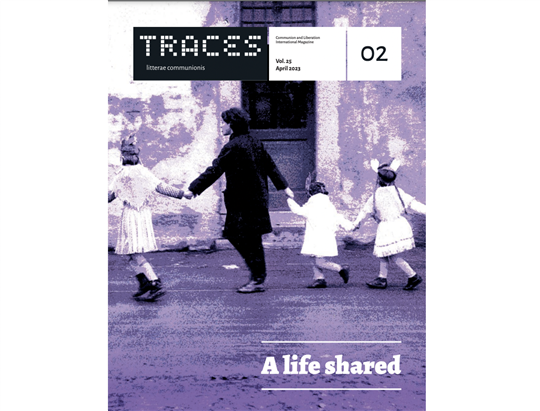
Traces, no. 2, April 2023
The law of existenceTo those who suffer, God does not provide arguments which explain everything; rather, His response is that of an accompanying presence.” In the CL Easter poster, the pope tells us that “God Himself wishes to share this path with us,” in the scandalously simple fact of a story of goodness that “opens up a ray of light” in every story of suffering. Fr. Giussani defined charity as a gift of self, moved. He wrote, “God’s charity for man is being moved, a gift of self that vibrates, agitates, moves, is fulfilled in emotion, in the reality of being moved: it is moved. God who is moved!” In order for life to be dominated by this love in a world where the idea of charity is reduced, Giussani proposed from the very beginning a gesture that would educate people to the awareness of our need: charitable work. Since then, thousands of people at every latitude have faithfully gone together to nursing homes, low-income housing projects, prisons, the streets, and many other places.
If we have something beautiful, we want to communicate it to others; if we see people who are worse off than ourselves, we want to help them. This is such a natural drive that Fr. Giussani called it a “law of existence.” In the booklet, The Meaning of Charitable Work, he took this need, so original that we are almost unaware of it, and described all of its dignity and power, opening it wide so that we could see its purpose, what gives this aspiration its meaning and fulfillment: “The supreme law of our being is to share in the being of others, to live in communion. Only Jesus Christ reveals this to us, because He knows what everything truly is, who God, from whom we are born, truly is, what Being truly is. I am able to understand the word ‘charity’ when I remember that the Son of God, loving us did not send us His riches (as He was able to do) and revolutionize our situation; instead, He became poor like one of us: He ‘shared’ our nothingness. We do charitable work in order to live like Christ.” This “being moved” makes us feel the full extent of the desire of each person for his or her destiny.
Giussani freed the gesture of charitable work from any idea of social justice and sentimentalism, as one reads in his biography. “There may be no, so to speak, ‘concrete’ result. We are tired of people who say ‘concrete’ about something other than the person, other than the pure and simple value of the ‘self.’” For Fr. Giussani, it is even ambiguous to start out from the need of others. “I do not know what they need. I cannot gauge it. I do not have it. I do not have the means to gauge it. Not even the most perfect society, the most legally well-founded organism, the most colossal amount of wealth, the most unassailable good health, the purest beauty, the most highly ‘educated’ civilization could ever make them happy. Christ makes them happy. He is the reason for everything, the One who made everything: God.” Thus, through the helplessness of one’s own love, one learns gratuitousness. “Exactly because we share ourselves with them, we do not make them happy.”
The testimonies in this issue talk about charitable work in a few corners of the world. It is often unclear who is helping whom, because we all need gratuitous love, as Cardinal Matteo Zuppi, the president of the Italian Episcopal Conference, reminded listeners in a recent assembly with the Solidarity Food Banks, in which he stressed the difference between doing volunteer work and living this school of charity, where “there is no accounting” and “a personal relationship,” never mechanical, is involved. “It is easier to work on solutions to problems or bring food, like Amazon,” he said, than to bring one’s self and to be in front of the other’s cry for life without dampening it, even to the point of our asking, “And me, what do I hope in?”